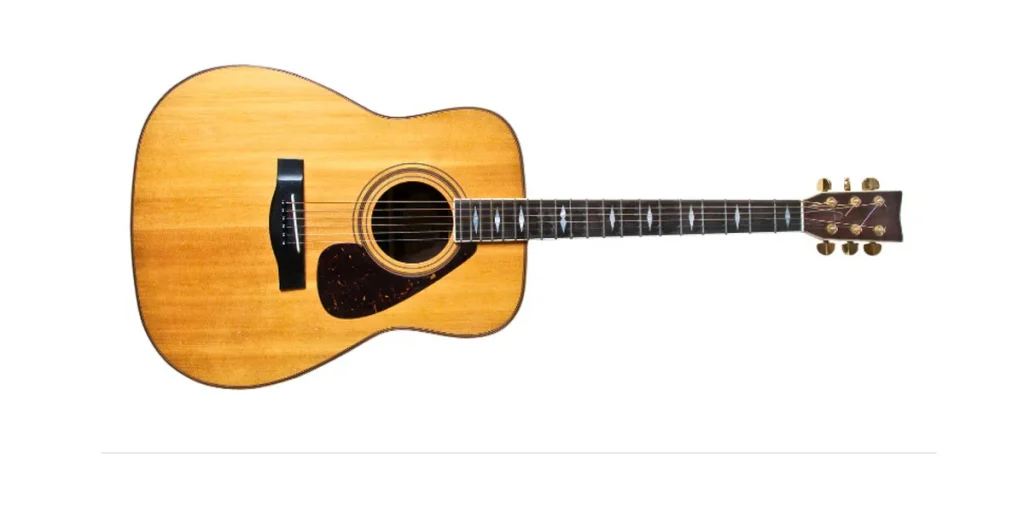An acoustic guitar typically weighs between 2.5 to 5 pounds (1.1 to 2.27 kg). The weight can vary based on size, materials, and construction.
An acoustic guitar is not just a musical instrument; it’s an extension of the artist’s expression and style.
Guitars come in various shapes and sizes, influencing their weight and playability. The construction material, such as spruce or mahogany, also plays a vital role in determining the final weight of the guitar.
Beginners might prefer lighter models for comfort during long practice sessions, while professionals may opt for heavier guitars for their tonal qualities and sustain.
Understanding the weight is crucial as it affects the instrument’s balance and ergonomics, ultimately contributing to the player’s performance and the instrument’s transportability.
Whether for a budding musician or a touring professional, an acoustic guitar’s weight is a key factor to consider when selecting the perfect strumming companion.
Acoustic Guitar Weight Basics
Understanding the weight of your acoustic guitar is important. It affects comfort and playability. Let’s dive into the basics of acoustic guitar weight.
Average Weight Range
The average weight of an acoustic guitar varies. Most weigh between 2.5 to 5 pounds (1.1 to 2.3 kilograms).
| Type of Guitar | Average Weight in Pounds (lbs) | Average Weight in Kilograms (kg) |
|---|---|---|
| Parlor | 2.5 – 3.5 | 1.1 – 1.6 |
| Dreadnought | 3.5 – 4.5 | 1.6 – 2.0 |
| Jumbo | 4.5 – 5 | 2.0 – 2.3 |
Factors That Affect Guitar Weight
Several factors can change a guitar’s weight. Here are the key elements:
- Wood type: Hardwoods like maple add weight.
- Size and shape: Larger bodies lead to heavier guitars.
- Components: Additional features like electronics can increase weight.
Materials And Design Influence

Materials and Design Influence play a crucial role in the weight of an acoustic guitar. The type of wood and guitar size can lead to significant weight differences.
Different materials can affect the tone of the guitar as well as its weight, making some guitars easier to handle for long periods.
Wood Types And Density
Acoustic guitars are often crafted from a variety of woods, each with its own density and weight. Some common wood types include:
- Mahogany: Dense and heavy, producing a rich sound.
- Spruce: Light and resonant, widely used for tops.
- Rosewood: Generally heavy, known for deep tones.
- Maple: Heavier, provides brighter sounds.
- Cedar: Lightweight and warm-toned.
The density of these woods affects the guitar’s overall weight, often ranging from 3 to 6 pounds (1.36 to 2.72 kg).
Body Style And Size
The design of the guitar body also impacts its weight. Common body styles include:
| Body Style | Features | Average Weight |
|---|---|---|
| Dreadnought | Large body, bold sound | 4 to 5 pounds |
| Concert | Smaller, comfortable | 3.5 to 4.5 pounds |
| Jumbo | Very large, powerful | 4.5 to 6 pounds |
| Parlor | Small, light, intimate sound | 3 to 4 pounds |
Smaller body styles tend to be lighter, making them a favorite for young players and frequent travelers.
Variation Across Brands And Models

Every guitarist stands before a myriad of options when choosing their instrument. The acoustic guitar, a timeless classic, is no exception.
Its weight varies not just among brands but also across different models within the same lineup.
Understanding these variations is key for players to find the perfect balance between comfort and sound.
Popular Guitar Brands Comparison
Guitar enthusiasts often have their favorites when it comes to brands. Each brand brings its unique flair to the table.
Let’s consider some heavyweight names in the guitar world and their average acoustic guitar weights.
| Brand | Average Weight |
|---|---|
| Martin | 2 to 2.5 kg |
| Taylor | 2 to 2.7 kg |
| Gibson | 2.5 to 3 kg |
| Fender | 1.9 to 2.5 kg |
| Yamaha | 1.8 to 2.6 kg |
Model Specifics And Weight Categories
Not only brands but specific models within these brands showcase a remarkable diversity in weight. Let’s take a quick look at different categories shaping guitarists’ choices.
- Lightweight Models: Typically under 2 kg, ideal for travel and comfort.
- Medium Weight Models: Ranging from 2 to 2.5 kg, a balance of tone and manageability.
- Heavier Models: Over 2.5 kg, favored for their rich, resonant tones.
Specific model lines might deviate from the brand averages, with variations influenced by wood types, body sizes, and additional features such as built-in electronics.
Impact Of Guitar Weight On Players
The weight of an acoustic guitar affects how players handle and play the instrument.
A guitar that’s too heavy can lead to discomfort or fatigue, while a lighter one might be easier to manage, especially for lengthy sessions or performances.
Understanding the impact of guitar weight on players is crucial for both comfort and technique.
Playability And Comfort
Guitarists often think about sound, but comfort is just as important. A well-balanced weight distribution across the guitar ensures a more enjoyable playing experience.
Light guitars are easier to hold, reducing strain on the shoulders and back. This aspect is particularly significant for those who play standing up or for long periods.
- Reduced physical strain helps maintain focus on technique.
- Lighter guitars may encourage longer practice sessions.
- Better balance allows for greater freedom of movement.
Weight Considerations For Beginners
For those new to playing, navigating the world of guitars can seem daunting. A beginner might overlook the weight factor, but it’s a key consideration.
A guitar that’s too heavy could discourage a new player, or worse, cause strain and pain. Beginners should aim for a guitar that feels comfortable, supporting a positive learning experience.
| Guitar Weight | Impact on Beginners |
|---|---|
| Lightweight | Great for long practice sessions. |
| Moderate | Good balance between tone and comfort. |
| Heavy | May cause early fatigue or discomfort. |
Selecting the right weight guitar can lead to a more effective learning curve. Additionally, it can protect against potential injury from awkward postures or excessive strain.
Choosing The Right Weight For You
Choosing the right weight for your acoustic guitar is vital. Your comfort, playability, and the sound quality of the instrument hinge on this.
Guitars come in varying weights, generally between 2.5 to 5 pounds (1.1 to 2.3 kg). Whether you’re serenading on the beach or practicing for hours, picking an instrument that sits right with you makes all the difference.
Balancing Sound Quality And Weight
When you hold a guitar, its weight is a clue to its build and sound character. Lighter guitars are easy to handle.
They can offer a vibrant, resonant sound. Yet, heavier ones might pack a punch in volume and sustain.
A balanced acoustic guitar weight enhances your music experience. Here’s how weight influences sound:
- Heavier guitars: Often equates to dense woods which provide rich, full tones.
- Lighter guitars: May use softer woods that resonate well and offer a brighter sound.
Personal Preferences And Ergonomics
Your body shape, strength, and playing style are key in choosing a guitar. Comfort reigns supreme, especially for lengthy jam sessions.
Your personal preference ties closely with ergonomics. Here’s a quick checklist to match a guitar’s weight with your needs:
| Consideration | Detail |
|---|---|
| Body Size & Strength | Smaller frames might favor lighter guitars for easier handling. |
| Playing Duration | Long sessions demand a comfortable weight to prevent fatigue. |
| Performance Style | Strummers may like heavier guitars; finger-pickers, lighter ones. |
| Portability | If you travel often, a light guitar makes on-the-go easier. |
Remember, the ideal weight should not strain your shoulders or back. It should allow your hands to move freely.
FAQ About the Weight of an Acoustic Guitar
What Is The Average Weight Of Acoustic Guitars?
Most acoustic guitars weigh between 2. 5 to 5 pounds. The specific weight depends on the size, materials used, and type of guitar.
Does Guitar Wood Affect Its Weight?
Yes, the wood type influences an acoustic guitar’s weight. Dense woods like maple add weight, whereas lighter woods like spruce reduce it.
Can A Guitar’s Weight Impact Playability?
Certainly, a guitar’s weight affects comfort and playability. Heavier guitars might be less comfortable during long playing sessions, especially while standing.
How Do Travel Guitars Compare In Weight?
Travel acoustic guitars are lighter, typically under 4 pounds, designed for portability without sacrificing sound quality.
Conclusion
Determining the precise weight of your acoustic guitar provides valuable insight for both transportation and playing comfort.
As we’ve explored, average weights vary from 2. 5 to 5 pounds, influenced by size, materials, and design.
Remember, the ideal instrument isn’t just about weight—it’s how it feels and sounds to you.
Choose wisely and play on!
Resources:
https://www.phys.unsw.edu.au/music/guitar/
https://online.berklee.edu/courses/acoustic-guitar-techniques
